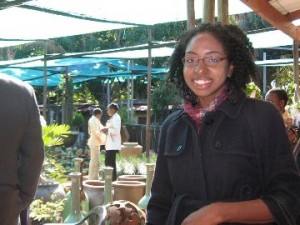 I didn’t intend to go to Southern Africa on a Fulbright last year to work on HIV/AIDS. The purpose of my sojourn to Gaborone, Botswana, was to research the development of online news media and to teach media studies classes at the University of Botswana. But my resolve to invest in both my academic and extracurricular lives brought me to Botswana-Baylor Children’s Clinical Center of Excellence, the first on the continent to focus exclusively on pediatric-HIV.
I didn’t intend to go to Southern Africa on a Fulbright last year to work on HIV/AIDS. The purpose of my sojourn to Gaborone, Botswana, was to research the development of online news media and to teach media studies classes at the University of Botswana. But my resolve to invest in both my academic and extracurricular lives brought me to Botswana-Baylor Children’s Clinical Center of Excellence, the first on the continent to focus exclusively on pediatric-HIV.
Through a volunteer gig writing articles for UNICEF-Botswana, I was introduced to the Baylor clinic, which is treating Botswana’s first generation of HIV-positive children to reach adulthood. Soon after I started, I also became a volunteer for the clinic’s Teen Club. I helped to facilitate monthly meetings and interviewed the group’s young leaders, who shared personal stories of losing their parents to AIDS and felt stigmatized because of their status.
Despite some incredible challenges, many of these young people vowed to realize their goals and inspired me with their strength and honesty. They could be themselves at Teen Club because unlike most teenagers, they all understood the burden of taking medications at the same time each day. Many of them feared what might happen if their crushes or closest friends learned of their status and they typically shared this information with few people. Practicing safe sex was crucial, but how do you tell a boyfriend or girlfriend that you’re HIV-positive? I gained a wealth of professional experience, a deeper understanding of the challenges facing Botswana, and a greater appreciation for the value of community as I worked closely with and observed young people who were forced to build their own.
That was probably the best part of my Fulbright year — an experience that involved becoming more engaged with my local community – an experience I wasn’t looking for, but one that ended up having a great impact on my life. If you’re about to depart on your own Fulbright grant, I encourage you to consider how you can invest in your academic and extracurricular lives. I bet you’ll be at your best — as a student and as a professional — when you’re investing in both.
For those of you preparing to apply for a study/research grant, consider the following:
Relevance
Can the study/research project you’re proposing be done anywhere else besides the country to which you are applying? If so, why does it have to be carried out there? In my proposal, I pointed specifically to government documents as well as to public and private investment in Information and Communication Technologies (ICT), supporting Botswana’s goal of becoming a regional ICT leader.
Timeliness
What’s happening in your proposed Fulbright country that makes this project relevant right now? Why is this important? I observed that the University of Botswana’s Media Studies Department was revamping its curriculum to prepare students for a future in online journalism and that there was very little documented research on new media in Botswana.
Suitability
Why are you best suited to complete your proposed Fulbright research and project? What have you done in the past that makes this project a logical next step for you academically or professionally? Before my Fulbright grant, I worked in newsrooms as a reporter and web producer, and started a blog for a nonprofit organization promoting gender advocacy and media training in Cape Town, South Africa. I aspire to become a leader in the field of international media development.
Photo: April Simpson, 2010-2011, Botswana, at a Gaborone Nursery and Tea Garden shortly before First Lady Michelle Obama spoke at a women’s leadership lunch
